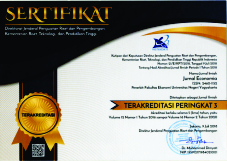Type of Personality, Acceptance of Dysfunctional Behavior and Audit Judgment
Downloads
Abstract: Type of Personality, Acceptance of Dysfunctional Behavior and Audit Judgment. This study aimed to describe the type of personality, acceptance of dysfunctional behavior toward audit judgment. This research was conducted in the province of Central Java, with 63respondents from the auditor on Public Accounting Firm city of Semarang and Solo. The sampling technique used purposive sampling. The results showed that the decision establishes audit risk, the number of auditors with the personality type B is more than that type A. Meanwhile, in setting the audit decision is not at risk, personality type B more than that type A. The results of data processing reception dysfunctional behaviors provide results that auditors receive audit dysfunctional behaviors make decisions more risk than the auditor who refused dysfunctional behavior.
Keywords: Audit judgment, personality type and acceptance of dysfunctional behavior.
Abstrak: Tipe Kepribadian, Penerimaan Perilaku Disfungsional dan Keputusan Audit. Penelitian ini bertujuan untuk mendeskripsikan tipe kepribadian, penerimaan perilaku disfungsional dan pengambilan keputusan audit yang diambil oleh auditor. Penelitian ini dilakukan di Propinsi Jawa Tengah dengan 63 responden dari auditor di Kantor Akuntan Publik kota Semarang dan Solo. Teknik pengambilan sampel menggunakan purposive sampling. Hasil penelitian menunjukkan bahwa dalam menetapkan keputusan audit berisiko, jumlah auditor dengan tipe kepribadian B lebih banyak jika dibandingkan auditor dengan tipe kepribadian A. Begitu pula dalam menetapkan keputusan audit tidak berisiko, tipe kepribadian B lebih banyak dibandingkan dengan auditor yang memiliki tipe kepribadian A. Hasil pengolahan data penerimaan perilaku disfungsional memberikan hasil bahwa auditor yang menerima perilaku disfungsional membuat keputusan audit yang lebih berisiko dibandingkan dengan auditor yang menolak perilaku disfungsional
Kata Kunci: Keputusan audit, tipe kepribadian dan penerimaan perilaku disfungsional.
Downloads
Chakraborty, I., Hu, P. J. & Cui, D. (2008). Examining the Effects of Cognitive Style in Individuals' Technology Use Decision Making, Decision Support Systems, 45, 228-241.
DeZoort, T, Harrison, P., & Taylor, M. (2006). Accountability & Auditors' Materiality Judgements: The Effects of Differential Pressure Strength on Conservatism, Variability, dan Effect. Accounting, Organization and Society, 31(1), 373– 390.
Dutta, D. K. & Thornhill, S. (2008). The Evaluation of Growth Inventions: Toward a Cognition-Based Model, Journal of Business Venturing, 23, 307-332.
Friedman & Rosenman, (1974). Type A Behavior dan Your Heart. New York: Afred A. Knop.
IAI-Kompartemen Akuntan Publik, (2001). Standar Profesional Akuntan Publik. Jakarta: PT Salemba Empat.
Ismail, F. (2015). Pengaruh Tipe Kepribadian, Pengalaman dan Penerimaan Perilaku Disfungsional terhadap Audit Judgment. Jurnal Bisnis dan Manajemen, 5(2), 263-278.
Iswari, T.I & Kusuma, I.W. (2013). The Effect of Organizational-Professional Conflict towards Professional Judgment by Public Accountant Using Personality Type, Gender, dan Locus of Control as Moderating Variables. Review of Integrative Business & Economics Research, 2(2), 434-448.
Jamilah, S., Fanani, Z., & Chandrarin, G. (2007). Pengaruh Gender, Tekanan Ketaatan, dan Kompleksitas Tugas Terhadap Audit Judgment. Jurnal SNA X Makassar.
Kennedy, J. (1993). Debiasing Audit Judgment with Accountability: A Framework dan Experimental Results. Journal of Accounting Research, 31(2), 231-245.
Kreitner & Kinicki. (2005). Perilaku Organisasi, buku 1. Jakarta: PT Salemba Empat.
Lim-u-sanno, Kulwadee. (2009). Audit Risk Judgment dan Performance of Thai Auditors: An Empirical Investigation of Their Antecedents dan Consequences. Journal of Academy of Business dan Economics, 9(3).
Mala, R & Chand , P. (2015). Judgment dan Decision-Making Research in Auditing dan Accounting: Future Research Implications of Person, Task, and Environment Perspective. Accounting Perspective. 14(1). 1-50.
Miller, J.D., (2009). Teori-teori Pengambilan Keputusan. Diakses dari http://hendriansdiamond.blogspot.com/2012/01/choice-menurut-terry-1989-faktor-faktor.html pada tanggal 23 Februari 2012.
Mohd-Sanusi, Z. & Mohd-Iskdanar T. (2006). Audit Judgment Performance: Assessing The Effect of Performance Incentives, Effort and Task Complexity. Managerial Auditing Journal. 22 (1). 34 – 52.
Prachsriphum, Suttinee, Chuchuea, & Sunisa., (2011). Audit judgment competency dan audit reporting quality: an empirical research of tax-auditors in Thailand. Journal of Academy of Business dan Economics.
Rayburn, J.M. & Rayburn, L.G. (1996). Relationship Between Machiavellianism and Type A Personality and Ethical Orientation. Journal of Business Ethics. 15(11), 1209-1219.
Robbins, SP & Judge, TA. (2013). Organizational Behavior (15th Edition). Pearson Education Limited.
Sugiyono. (2010). Metode penelitian bisnis (pendekatan kuantitatif, kualitatif, dan R&D. Bandung: CV Alfabeta.
Utami, I & Nahartyo, E. (2013). The effect of Type A Personality on Auditor Burnout: Evidence from Indonesia. Accounting & Taxation. 5(2). 89-102.
Wedemeyer, (2010). A Discussion Of Auditor Judgment as The Critical Component in Audit Quality – A practitioner's Perspective. International Journal of Disclosure dan Governance 7, 320–333.
Yendrawati, R. (2008). Analisis Hubungan Antara Profesionalisme Auditor dengan Pertimbangan Tingkat Materialitas Dalam Proses Pengauditan Laporan Keuangan. Jurnal Penelitian dan Pengabdian, 6(1), 193.
Yustino, Wimpie & Iswari, T.I. (2016). The Effects of Job Cognition and Personality Type On Auditor Judgment. Jurnal Siasat Bisnis. 20(1). 14-23.















